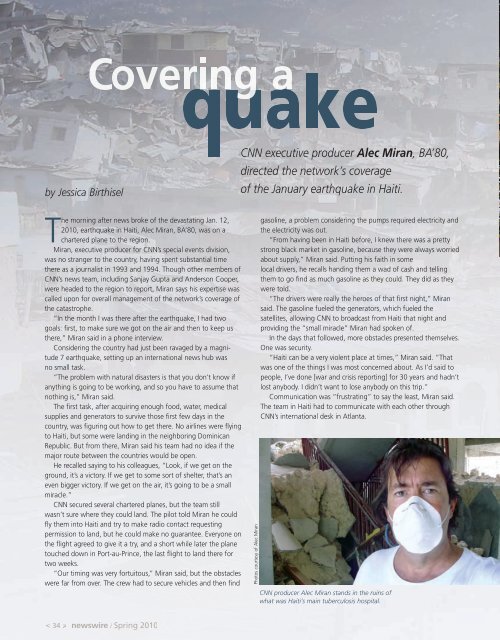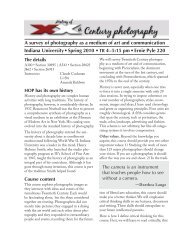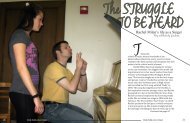The changing face of photojournalism - Indiana University School of ...
The changing face of photojournalism - Indiana University School of ...
The changing face of photojournalism - Indiana University School of ...
- No tags were found...
You also want an ePaper? Increase the reach of your titles
YUMPU automatically turns print PDFs into web optimized ePapers that Google loves.
Covering aby Jessica BirthiselCNN executive producer Alec Miran, BA’80,directed the network’s coverage<strong>of</strong> the January earthquake in Haiti.<strong>The</strong> morning after news broke <strong>of</strong> the devastating Jan. 12,2010, earthquake in Haiti, Alec Miran, BA’80, was on achartered plane to the region.Miran, executive producer for CNN’s special events division,was no stranger to the country, having spent substantial timethere as a journalist in 1993 and 1994. Though other members <strong>of</strong>CNN’s news team, including Sanjay Gupta and Anderson Cooper,were headed to the region to report, Miran says his expertise wascalled upon for overall management <strong>of</strong> the network’s coverage <strong>of</strong>the catastrophe.“In the month I was there after the earthquake, I had twogoals: first, to make sure we got on the air and then to keep usthere,” Miran said in a phone interview.Considering the country had just been ravaged by a magnitude7 earthquake, setting up an international news hub wasno small task.“<strong>The</strong> problem with natural disasters is that you don’t know ifanything is going to be working, and so you have to assume thatnothing is,” Miran said.<strong>The</strong> first task, after acquiring enough food, water, medicalsupplies and generators to survive those first few days in thecountry, was figuring out how to get there. No airlines were flyingto Haiti, but some were landing in the neighboring DominicanRepublic. But from there, Miran said his team had no idea if themajor route between the countries would be open.He recalled saying to his colleagues, “Look, if we get on theground, it’s a victory. If we get to some sort <strong>of</strong> shelter, that’s aneven bigger victory. If we get on the air, it’s going to be a smallmiracle.”CNN secured several chartered planes, but the team stillwasn’t sure where they could land. <strong>The</strong> pilot told Miran he couldfly them into Haiti and try to make radio contact requestingpermission to land, but he could make no guarantee. Everyone onthe flight agreed to give it a try, and a short while later the planetouched down in Port-au-Prince, the last flight to land there fortwo weeks.“Our timing was very fortuitous,” Miran said, but the obstacleswere far from over. <strong>The</strong> crew had to secure vehicles and then findPhotos courtesy <strong>of</strong> Alec Mirangasoline, a problem considering the pumps required electricity andthe electricity was out.“From having been in Haiti before, I knew there was a prettystrong black market in gasoline, because they were always worriedabout supply,” Miran said. Putting his faith in somelocal drivers, he recalls handing them a wad <strong>of</strong> cash and tellingthem to go find as much gasoline as they could. <strong>The</strong>y did as theywere told.“<strong>The</strong> drivers were really the heroes <strong>of</strong> that first night,” Miransaid. <strong>The</strong> gasoline fueled the generators, which fueled thesatellites, allowing CNN to broadcast from Haiti that night andproviding the “small miracle” Miran had spoken <strong>of</strong>.In the days that followed, more obstacles presented themselves.One was security.“Haiti can be a very violent place at times,” Miran said. “Thatwas one <strong>of</strong> the things I was most concerned about. As I’d said topeople, I’ve done [war and crisis reporting] for 30 years and hadn’tlost anybody. I didn’t want to lose anybody on this trip.”Communication was “frustrating” to say the least, Miran said.<strong>The</strong> team in Haiti had to communicate with each other throughCNN’s international desk in Atlanta.CNN producer Alec Miran stands in the ruins <strong>of</strong>what was Haiti’s main tuberculosis hospital.< 34 > newswire / spring 2010
















